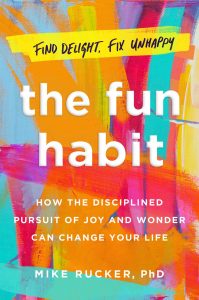 An excerpt from the newly published book by Mike Rucker, Ph.D.
An excerpt from the newly published book by Mike Rucker, Ph.D.
I have spent most of my life searching for happiness. It was like a puzzle that I could never quite figure out. As an adolescent, I was a hopeless wannabe with an agonizing desire to find my rank in the social structure of my small hometown of Davis, California. Unhappy at home, I emancipated as a teenager to see if happiness was somewhere out there in the world, waiting for me. It’s been quite a journey since then.
People have always wanted to be happy, but the idea of happiness as a learned skill has never been so popular.
Today, there’s a happiness industrial complex of gurus, psychologists, institutions, and organizations attempting to “solve” the happiness problem for good. Book after book is written on how to experience more happiness from neurological, psychological, religious, and spiritual perspectives. The promise of happiness, separate from wealth, achievement, or any other external factor, strikes a major chord. Many of us feel helpless nowadays as we try to journey toward the good life against what sometimes feel like impossible headwinds.
For everyone, from baby boomers unable to reconnect with the joys of the past to younger generations experiencing record levels of loneliness, anxiety, and burnout, the pursuit of happiness holds out hope as the answer to our problems. The thinking goes that if we can only activate our “happiness switch,” other challenges in life will lose their edge. Inner satisfaction can be found no matter how grim our circumstances. Did I mention that the office now has a Zen room?
As you will soon discover, pursuing happiness in and of itself can be a trap.
In fact, for almost all of us, chasing happiness makes us anything but. I know because I fell for that happiness trap myself. Back in early 2016, I felt I had checked all the boxes in the pursuit of happiness: A good marriage and two healthy children. Successful endeavors as both an entrepreneur and an intrapreneur. A two-time Ironman. Well-traveled, having stepped foot on every continent. A Ph.D. with published, peer reviewed research. Various accolades for being influential in my field. Most would say I had it all. Objectively, life was good. Furthermore, as a charter member of the International Positive Psychology Association, I had positioned myself at the cutting edge of research into happiness. Naturally, I put all the latest findings to use in my own life. As a member of the Quantified Self community, I optimized my life not only qualitatively, but quantitatively as well — logging my good days and bad days, constantly looking for correlations and ways to improve. I had reached a pinnacle. There was little else I could do to make myself happier, no technique I had yet to employ.
I’m an avid blogger, and in support of this hobby, I send a quarterly newsletter on or around the twenty-third every three months (December, March, June, and September). June 23, 2016, was business as usual. I hit send on my newsletter, which was essentially a victory lap that life at that moment was amazing. Toward the end of the newsletter, I celebrated recently checking off a bucket list item with my beloved brother, Brian— riding the tallest roller coaster in the world, the Kingda Ka.
At some point within twenty-four hours of hitting send on that newsletter, my brother passed away unexpectedly from a pulmonary embolism. It felt surreal: Just as my friends, family, and followers were reading how much I enjoyed the experience that he and I had shared, Brian’s tragic passing ensured there would never be another such opportunity. As the shock wore off, I found myself deeply sad and unsettled. This period opened an uninvited path to questioning everything.
A short time later, I found myself in the hospital needing major hip surgery.
When I woke up after the procedure, I couldn’t feel my legs. Lying in the hospital bed, I struggled to stay positive. I’d built my life around staying physically active and benefiting from a positive mindset. Now I was adjusting to the reality I would never competitively run again, and emotionally, I was a wreck. The traditional tools of positive psychology were failing me. No matter how much I meditated or wrote in my gratitude journal, happiness remained elusive. I finally had to admit to myself these tools had lost their utility. A believer in happiness, yet not able to feel happy, I experienced significant cognitive dissonance. I’d thought I had life figured out, and now I was lost again.
The feeling in my legs returned, thankfully. And, as I recuperated in the months that followed, something significant began to dawn on me. I began to wonder whether trying so fervently to be happy had been part of the problem. Because when I stopped criticizing myself for being unhappy, something amazing happened. The energy I was burning up relentlessly focusing on my happiness ultimately became available for use elsewhere. Instead of perseverating on the gap of what was missing, I began to make better choices in the present moment, using my time to take action and have fun. As you’ll soon read, this ranged from simple stuff like finding creative ways to ensure my wife and I had scheduled time to connect, to an unorthodox approach to physical therapy that afforded me the opportunity to be a better dancer while connecting with my daughter.
Over time, this realization blossomed into a full-blown epiphany. I finally saw how futile, even counterproductive, my efforts to grasp and then hold on to happiness had been—not just in that time of crisis, but for years. The work of being happy had been eating into the limited time and attention I had for experiencing life.
Scientifically, my epiphany made perfect sense. Happiness evolved for a reason: to lure us toward those things and activities that improve our chances of survival. If we always felt satiated, we would have little motivation to move forward. Sometimes dissatisfaction, not happiness itself, is what drives us. Yet, even though many of us understand this conceptually, the quest for happiness remains universal. Just as Sisyphus mindlessly rolled his boulder uphill only to watch it tumble back down, we struggle endlessly with the effort of becoming and then staying happy without ever questioning the value of the effort itself.
Personally, I’d now arrived at the belief that my deliberate concerns of being happy only drew my attention to what was missing, making me more unhappy. (I have since come to learn that emerging research on the science of happiness, which I’ll be sharing in the pages of this book, supports this insight.) I began to accept that being sad about my brother’s death, and then fearful for my physical recovery, were appropriate and inevitable responses to real tragedy. Grief and pain are part of the human experience. But in the thralls of pursuing happiness, instead of accepting this fact, I had deepened my misery by trying to subdue grief and avoid pain. I’d been so overprescribed on the need to be happy, I hadn’t honored the need to process, to feel, to mourn.
But if deliberately chasing happiness left me miserable, what was the alternative?
Is there anything we humans can rely on to pull us through periods of darkness? I began to ask less introspective questions. Instead, I focused on compassionately exercising my autonomy and agency in alignment with my values. As I set aside the self-recrimination and began to get more active, despite my state of grief, a second, crucial insight clicked into place: I couldn’t always make myself happy, but I could almost always have fun. I could create moments of enjoyment and pleasure by being deliberate about it—yes, even while owning that I was sad. As you’ll soon read, fun can coincide with a variety of emotional states, or even transcend them altogether.
Unlike happiness, fun isn’t a reaction to your circumstances. It’s an action orientation, one you control and can enact almost anywhere, anytime. It’s also enormously beneficial, physically and psychologically. Instead of concern about what might be missing, a bias toward fun affords immediate gains.
Fun is a direct neurological route to improving our well-being—and yet, as I would find, it is also a skill that requires some training, at least for anyone deeply engaged in the serious business of adulting. Kids embrace fun naturally, but as adults we face three obstacles:
1 We’re conditioned as we age to believe that trying to have fun is childish, even inappropriate.
2 We undervalue the mental and physical benefits of fun.
3 We’re put off by the counterintuitive fact that fun for busy adults requires discipline, which sounds . . . well, not fun.
By the time you finish The Fun Habit, you will be armed with clear and compelling scientific evidence for the life-sustaining value and importance of fun. You will learn tactics and techniques for making fun a regular part of your life in a way that feels comfortable and authentic, not forced or phony. These techniques have dramatically improved my well-being, and I’ve used them to help others with wonderful success.
I’m no guru descending from the mountaintop. When I say it’s time to stop chasing happiness and start having fun, these principles are fully grounded in peer-reviewed research. My team and I have spent years authenticating the ideas and strategies you are about to discover. We all have the agency to live more joyful lives; we just do not have the right tools. This book solves that problem.
Want to hear more? Listen to our conversation with Mike Rucker on the Fundraising Leadership Podcast.
 Mike Rucker, in no particular order: Author. Father. Husband. Organizational psychologist and behavioral scientist. Recovering entrepreneur. Fitness enthusiast with mechanical parts. VW Bus aficionado. Seeker. Traveler. Future astronaut.
Mike Rucker, in no particular order: Author. Father. Husband. Organizational psychologist and behavioral scientist. Recovering entrepreneur. Fitness enthusiast with mechanical parts. VW Bus aficionado. Seeker. Traveler. Future astronaut.